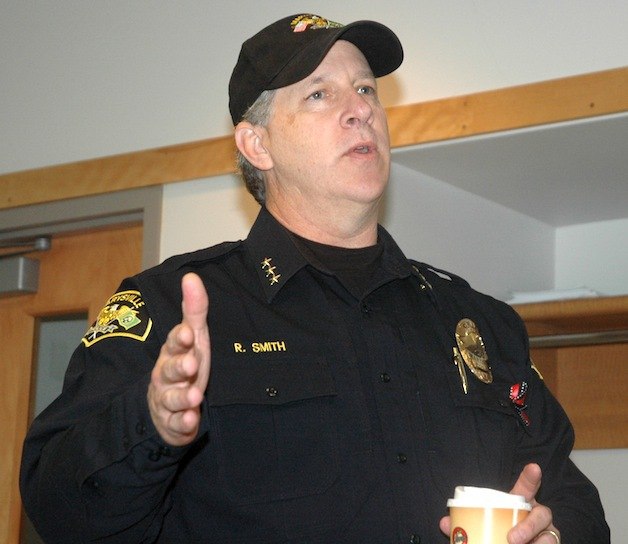MARYSVILLE — He’d already spoken at a church vigil, a charity dinner, a community awareness kickoff, press conferences and meetings with parents and children about the Oct. 24 shooting at Marysville-Pilchuck High School.
So on Oct. 29, Mayor Jon Nehring shifted gears to conduct an already-scheduled coffee klatch about other matters affecting the city and its citizens, and attendees had plenty of concerns to bring to him and Police Chief Rick Smith.
A resident of a north Marysville neighborhood on 132nd Street NE cited a number of incidents in connection with two suspected drug houses in their midst, from house and vehicle prowls and thefts, to a man exposing himself to teenage girls. Smith reassured her that the police department is aware of the problems, even as he encouraged residents to continue to call them in.
“We’re working on an action plan to put those folks away for good,” Smith said. “That’s an area of emphasis for us. The more you report it, the more effective we will be.”
Smith cited Lt. Larry Buell as the department’s point of contact for helping set up Neighborhood Watch programs, to make citizens partners with police.
“We’re giving you the tools to become leaders; we can switch from reactive to proactive policing,” Smith said.
Nehring addressed fears of increased traffic congestion due to trains by outlining the steps the city is taking to connect the State Route 529 bridge between Marysville and Everett to I-5, to ease the pressure on Fourth and 88th street intersections.
Snohomish County has pledged $500,000 toward such a project, and the Puget Sound Regional Council has attested to the impact of trains on Marysville’s traffic congestion. The city still needs to pay for an Interchange Justification Report and complete 30 percent of the project’s design work by next year to qualify for additional funding, by showing Congress the project is “shovel-ready.”
“We’re investing a lot of Marysville taxpayers’ money on this already,” Nehring said. “We can’t foot the full bill ourselves.”
Although Nehring would welcome mitigation fees from the railroads, he noted that this would violate the interstate commerce clause.
When a resident of the Hidden Lake Estates in Marysville objected to the amount of garbage left behind by transients who had been cleared out, Nehring explained that the city has to work with property owners on such cleanups.
“The police will clear out the transients, but we ask the property owners to take care of the trash they leave behind,” Nehring said. “We can help you out with a cleanup one time.”
Nehring and Smith agreed that the city’s crackdown on aggressive panhandling has been largely successful, but at the same time, they encouraged citizens to redirect their compassion, from handing out spare change, to contributing to local charities which address the drug additions and mental health issues that often lead to homelessness in the first place.
“As we’ve heard, there’s no more room for these people in the county jail,” Nehring said. “Even if there were, we want to help the truly needy, not just push them through a revolving door.”



